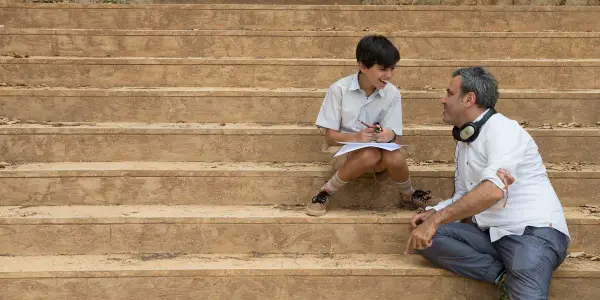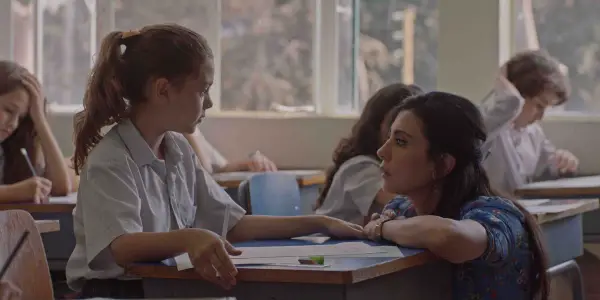TIFF 2019: Interview With Director Oualid Mouaness & Star Nadine Labaki Of 1982

Monique Vigneault is a Mexican-Canadian film critic. She regularly covers…
Oualid Mouaness bursts into the international film scene with his directorial debut, 1982, a wistful fictionalization of his childhood during the Lebanese civil war starring actress Nadine Labaki. 1982 stands out as a key player in TIFF’s Contemporary World Cinema programme because of its unconventional and beautiful reflection of the Lebanese civil war through the eyes of an 11-year-old boy.
I got the chance to speak to both Mouaness and Labaki on the lasting effects of the civil war on Lebanese cinema, and why they’ve turned to film. When Mouaness‘ fuzzy, distant voice first rings through from Los Angeles, his energy is light, he chuckles at his own jokes and fondly recalls gushy letters he sent to girls at school. It becomes immediately clear that this is someone with great fondness for their craft.
Monique Vigneault for Film Inquiry: Hi Oualid! Thanks for taking the time to speak with us today, I understand you’re on quite a tight schedule. First of all, congratulations on your stunning directorial debut and it’s premiere here at TIFF!
Oualid Mouaness: It’s my pleasure, absolutely. Thank you for taking the time, I know you also have a tight schedule.
You’ve said that 1982 was heavily based off your experiences during the civil war, what was the process of fictionalizing that part of your life like?

Oualid Mouaness: It was tough. It was tough because emotionally it was a huge part of my life. The whole day — that particular day in 1982, I’d had a lot of flashes of images most of which have actually materialized in the film — which was essentially the dogfight in the sky and the parents picking up their kids.
So it was hard — I started writing the short story and for me it was very emotional, I couldn’t find the right words to express it. It wasn’t until I was having a conversation with a very trusted friend and she was like, ‘this is a film’.
So it took me a year after that conversation to actually put pen to paper and it was actually quite cathartic.
That was going to be my next question. Did you find it cathartic to explore this period of your life and your nation’s history?
Oualid Mouaness: My whole thing in that moment in time also is, one, as a kid, I was uncontaminated by anything adult-like or any of the bigger problems that were going on in Lebanon. It was also a very human thing I felt I had to express which hadn’t been expressed. Not only for myself but also on behalf of the Lebanese people that went through this.
But for me, I just wanted to highlight and state the reality of my situation which was the openness of the school.
How did you initially start thinking about 1982? Is Wissam a reflection of your younger self? Are there elements of yourself that naturally spilled into this character?
Oualid Mouaness: I’m sure. I think the narrative has to do a lot with the letter-writing and the not-so-good drawings — that’s exactly how I was as a kid. I did have, like, an insane crush, and I got in serious trouble at one point because of the love note and that really stayed with me, when I was told I wasn’t supposed to feel or think the things I was. That was to me destructed by my mom saying, ‘I know this, you’re too young for this.’ And it was also destructed by what happened in the war, obviously.

The film teeters between this childlike fantasy and realism — how did you initially come up with this idea?
Oualid Mouaness: For me the adult realism was brutal, and the film treads through those lines very carefully.
Essentially the love story in 1982 is also the war story and that encroaches on the kid’s story, which approaches towards the end — I wanted it to have that weight. For me the fantasy was the outlet, it was like it was me as a writer and as a film-maker saying, ‘I want out of this, I do not want this I do not want this.’
The civil war is very prevalent in Lebanese cinema. How do you think audiences in Lebanon will respond to 1982?
Oualid Mouaness: My hope is — that’s right, my hope is, that you’ve never seen a film portrayed in this light, which is actually the way we [Lebanese people] are. The film does stage a very dark chapter of our civil war which was when I decided to explore and tell the story of the people who were in the middle of it, the people trying to get on with their lives despite everything that was going on around us. I do think the Lebanese people will see and will find themselves in the film. As people, as humans, and also in terms of how they’re sort of torn between both sides because that’s really emblematic of the experience.
When did you first realize you wanted to pursue a career in film?
Oualid Mouaness: A very long time ago. I knew I wanted to be somehow in the writing world ever since I was very very young, my early teens actually.
So it was something that I’d known ever since I was a kid and then I did pursue it in undergraduate and graduate school — but I needed to develop more as a storyteller and as a filmmaker. It sort of naturally progressed, and I think that progression is what enabled me to tell the story the way I’m telling it now. Maybe if I’d told it ten years ago it wouldn’t be the same. So the film sort of wrote itself over the course, from producing and then into directing, which was sort of a natural progression.

Nadine Labaki, easily one of the most recognizable players in Arab cinema, delivers a layered performance as Yasmine in Mouaness‘ 1982, just a year after her Cannes Jury Prize-winning Capernaum. Labaki slinks from one end of the camera to the other, continuing to show off her craft as both an accomplished director and actress.
Monique Vigneault for Film Inquiry: You tend to take on or direct films which have something to say either politically or socially, do you see an intrinsic tie between storytelling and activism?
Nadine Labaki: I mean — I see it as a responsibility when you have this tool. And I’m sure that in some way Oualid was trying to convey this message. I think when you come from this part of the world you know how much of a mission and power your tool has.
So, I think you sort of become an activist without wanting to, because you’re trying to humanize a situation. You’re trying to bring your own perspective on things and you sort become an activist without wanting.
In 1982, Yasmine, who you play, is somewhat fraught and torn by opposing sides of the political spectrum — what was it like portraying a woman grappling to find a middle ground amidst such a divided personal crises?”
Nadine Labaki: It’s something I personally know very well, living through the civil war in Lebanon and going through this and for many different periods of my life I was living in a country of political divide. It was a culture of more so belonging to a group than a country. We had been living in this situation for quite sometime, so I think I do understand her position and her being torn. Because then again each one person and each one story — nobody is a winner in wars, I think. In a way, we all lose something somehow. We’re all losers in a war.
In recent years, the world of film has seen a radical shift in its treatment of women, have you seen a rise in complex roles which allow women to be flawed and nuanced on screen?
Nadine Labaki: I think it’s on everyone’s mind — I think it’s a debate right now in the world of movies and art. And in general. The position of women, the portrayal of women. It’s a big question. But I think it’s a very healthy one, and it’s creating this sort of discussion among people and this is the way we’re seeing change — because we’re talking about it. We’re not there yet — we have a long way to go but I can see the change.
Film Inquiry would like to thank Oualid Mouaness and Nadine Labaki for taking the time to speak with us.
Watch 1982
Does content like this matter to you?
Become a Member and support film journalism. Unlock access to all of Film Inquiry`s great articles. Join a community of like-minded readers who are passionate about cinema - get access to our private members Network, give back to independent filmmakers, and more.
Monique Vigneault is a Mexican-Canadian film critic. She regularly covers world cinema on the festival circuit.













